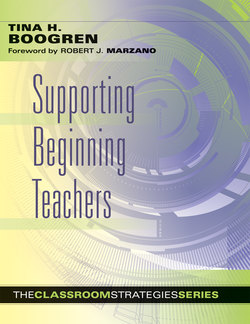Читать книгу Supporting Beginning Teachers - Tina H. Boogren - Страница 9
На сайте Литреса книга снята с продажи.
ОглавлениеINTRODUCTION
Supporting Beginning Teachers is part of a series of books collectively referred to as The Classroom Strategies Series. This series aims to provide teachers, as well as building and district administrators, with an in-depth treatment of research-based instructional strategies that can be used in the classroom to enhance student achievement. Many of the strategies addressed in this series have been covered in other works, such as Classroom Instruction That Works (Marzano, Pickering, & Pollock, 2001), Classroom Management That Works (Marzano, 2003a), The Art and Science of Teaching (Marzano, 2007), and Effective Supervision (Marzano, Frontier, & Livingston, 2011). Although those works devoted a chapter or part of a chapter to particular strategies, The Classroom Strategies Series devotes an entire book to an instructional strategy or set of related strategies.
Undoubtedly, a teacher’s first year in the classroom is one of the most important. All at once and in real time, the new teacher must implement strategies learned in teacher preparation programs and during student-teaching experiences. Furthermore, it is during this transition from student teacher to independent teacher that one truly begins to realize the nuances and complexities of the profession. As the New Teacher Project (2013) stated, “Teachers who make a strong start are much more likely to become and remain strong educators over time” (p. 1). Given this insight, the question becomes, How can we support our new teachers in becoming and remaining strong educators for years to come? The answer lies in a purposeful and comprehensive mentoring program.
We begin with a brief but inclusive chapter that reviews the research and theory on retaining and supporting new teachers. Although you might want to skip this chapter and move right into those that provide recommendations for practice in schools, we strongly encourage you to examine the research and theory, as they are the foundation for the entire book. Indeed, a basic purpose of Supporting Beginning Teachers and other books in The Classroom Strategies Series is to present the most useful strategies based on the strongest research and theory available.
Because research and theory can provide only a general direction for classroom practice, Supporting Beginning Teachers goes one step further and translates that research into applications for those who support new educators. Chapter 2 outlines a general philosophy and set of principles that administrators can use when creating and overseeing a mentoring program and that mentor teachers can apply to their work with beginning teachers. Chapters 3, 4, 5, and 6 provide specific strategies designed to support the needs of new teachers, presented in four general categories: physical (chapter 3), emotional (chapter 4), instructional (chapter 5), and institutional (chapter 6).
How to Use This Book
Mentors and coaches can use Supporting Beginning Teachers as a self-study text that provides an in-depth understanding of different ways to support educators during their initial years in the profession. Additionally, school leaders might use it to enhance building-level support systems for new teachers. As you progress through the chapters, you will encounter comprehension questions. It is important to complete these questions and compare your answers with those in appendix A (page 71). Such interaction provides a review of the content and allows a thorough examination of your understanding. Groups or teams of teachers and school leaders who wish to examine the topic of supporting beginning teachers in depth may also use this book. When this is the case, teams should answer the questions independently and then compare their answers in small- or large-group settings. Appendix B (page 79) includes a number of personal essays that I wrote during my first years of teaching, each of which explores a different theme related to teaching. Mentors can read and discuss these essays with mentees, as well as use them to reflect on their own experiences during their first years of teaching.
